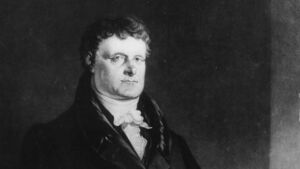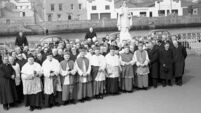Irish history shows that O'Connell was right

The political philosophy and moral purpose of Daniel O'Connell was in stark contrast to those who pursued a campaign of violence in pursuit of Irish unity. Picture: Hulton Archive/Getty Images
I’ve often wondered why I’ve been so uncomfortable with the physical force element in Irish history. I used to trace it to my unease as a child with Padraig Pearse’s coupling of ‘the fight for Irish freedom’ with blood sacrifices that had forced resonances with Jesus dying on the cross on Calvary – paying the ultimate sacrifice for the ultimate good.
Years later as I studied history I came to realise that whatever substance there was in my instinctive revulsion from the bloody sacrifices that peppered the road to 1916 and beyond and the ballads and the culture that glorified them had found an alternative strategy in the political philosophy of the Liberator, Daniel O’Connell.
O’Connell became my hero as the violent and bloody history of the fight for Irish freedom – that justified any level of violence and death – became more and more suspect as many young men of twenty were given guns and bombs and sent out to kill often indiscriminately not just the perceived enemies of Irish freedom but innocent bystanders regarded as collateral damage in the ‘glorious campaign’.
As a young man when the Northern Troubles were at their deadliest, my contemporaries wrongly convinced that they were fighting for (and if necessary dying for) Ireland found themselves holding AK-47s and carrying bombs as people were gunned down or blown to bits as any sacrifice by the ‘freedom fighters’ or those they eliminated was justified in a series of increasingly violent and bloody campaigns.
And as a young man I watched on RTÉ Television’s evening news as police picked through the devastation of the subsequent outrages gathering body-parts into body-bags while spokespersons for the Provos and other copycat groups competed in defending their role in ‘the fight for Irish freedom’ and the glorious accolades that they imagined would follow.
But as the campaign continued, it was becoming progressively more obvious by the day that, with leaders like John Hume and Seamus Mallon patiently teasing out the indefensible reality behind the ballads and the blarney, the Provo campaign had morally run into the sand. The final solution – after decades of murder and mayhem and incalculable mountains of pain and suffering – meant Hume and others had to ease the ‘freedom fighters’ towards a peace dividend.
The trick was to get them to throw in the blood-soaked towel yet allow them to pretend that any dividend that accrued from three decades of madness would be attributed to the ‘freedom fighters’. But the Irish people knew that deep down it was all a pretence to allow the Provos their moment in the sun and to get them to see sense.
Over three decades of bombing and killing and graves and funerals and all the craziness and sufferings that ensued, it was a small price for peace to indulge the public strutting of Provo leaders taking laps of honour on the international stage as they imagined themselves the victors.
For me the figure of Daniel O’Connell hovered over those three decades as, in comparison, his political philosophy and moral purpose set in relief the very opposite of the Provo course. The Provos sought the glory and continue to claim that their campaign of violence and blood was justified mostly because they never gave in – a reality now undermined as their ‘celebrations of victory’ have diminished into sing-songs in alcohol-laden tributes in pubs and in quasi-military posturing at the funerals of the ‘freedom fighters’.
On the other hand, those who laud the O’Connell philosophy, praise him for knowing as a public servant with a clear moral compass that there comes a point at which it is the responsible, ethical decision to give in. O’Connell recognised that point had arrived when as the famous Clontarf Monster meeting of 1843 drew near, he took an adult decision to call off the meeting because he knew that if it went ahead the probability was that it would result in a huge loss of life.
Thus, the Provo mentality could claim that O’Connell’s strategy was a failure and that O’Connell himself was a coward. it was an unsurprising riposte as the tradition of violence was so embedded in the Irish psyche that O’Connell, as a result of the Clontarf decision, could easily be presented as a failure.
But, as we know things are not always what they seem. The Provo ‘victory’, though presented as such in the declining ‘blood and violence’ tradition of Irish politics, now widely discredited, was in effect a ‘defeat’ because, as many commentators now point out, a united Ireland had more chance of becoming a reality if unity was based on the uniting of the people of the north and south and not on bombing them into a united Ireland. So, from that perspective, the Provo campaign was a disaster.
In simple terms, the ‘blood and violence’ tradition is now past its sell-by date and the dawning truth is that if O’Connell’s pacifism had been adopted as a realistic option there would be no point in inflicting the recent Troubles on our people, north and south, and no need for the 1916 bloody campaign as much more would have happened more gradually in terms of movement towards unity among people north and south – without the murder and the mayhem of those years.
The difficult truth is that the Provo campaign achieved very little and that the O’Connell formula of responsible pacificism would have delivered as much or maybe more without the huge loss of life and the terrible theatre of suffering so many had to so needlessly endure.




